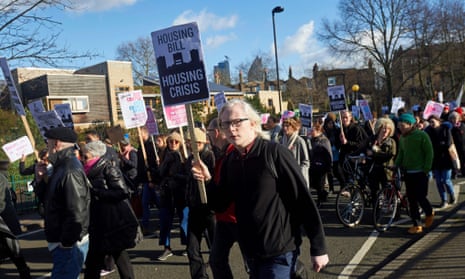Whisper it, but the wheels are coming off the housing bill. Lord Kerslake argued in the Guardian back in January that the last chance to restrain the bill lay with the House of Lords. The upper house has now inflicted numerous defeats and concessions on the bill, which suffered 11 defeats in the second chamber, and is being torn apart and criticised by peers from across the political divide. Concessions have been won on sustainability, the clumsy “pay to stay” proposal, and the attack on lifetime tenancies in social housing.
Shortly before the general election campaign officially began, rumours emerged that the Conservative party was planning to promise to extend right to buy to all social housing tenants, not just those in council properties. Right to buy has been hugely divisive since its advent in the 1980s – Labour sought to cut the discount on properties under Tony Blair, and the coalition government ramped the discount up in turn to encourage more tenants to shift their home from local authority control to the private market. The move to extend it was seen as a clear attack on social housing.
Now, the policy faces more criticism, from a damning Commons public accounts committee report. The report says the policy is not costed and not fair. Usually, the PAC convenes to assess policies that are already in place, so the move to review the financial case for the right-to-buy extension is unusual and shows the wide alarm at the potential knock-on effects of the policy. The committee states in the report that it is mindful of “both the potential impacts of the policy on a large number of individuals, and the significant amount of public money likely to be involved”.
The committee concludes that the government has presented parliament with little information on the potential impacts of the legislation requiredand that it is not clear how this policy will be funded in practice, or what its financial impacts might be.
Meg Hillier, chair of the public accounts committee was even blunter: “The approach to paying for this policy seems to be entirely speculative. On the basis of evidence heard by our committee, there are no costings or workings out,” she has said. “We are not talking about a ‘back of an envelope’ calculation – there is no envelope at all.”
The committee confirms what many have long argued: the policy is ideological rather than cost-driven, a symbolic gesture to prop up the fetishisation of home ownership, while also acting as a land grab on social housing. The ideological war on housing shows the disdain the Conservatives feel for the fact that a considerable chunk of the UK’s housing stock exists outside of the remit of profit.
Private rent pours money into the pockets of landlords; home ownership is seen as an investment and a way of shoring up pensions. That some people pay rent below the exorbitant rates of the private market, and that this rent is reinvested by local authorities and housing associations is politically abhorrent to a tribe who deem profit as the greatest social good.
The report, the amendments from the Lords and the protestors fighting the housing bill: all agree that Conservative housing policies are half-baked, a fiscal nonsense, and clearly not thought through.
The public is clamouring for an evidence-based, effective and serious response to the housing crisis that will see more rights for tenants, a stable market, and house building of appropriate tenure and type; but instead, we are offered a cobbled-together ragtag bundle of nonsense.
With a larger and louder body of officials, members of the public and politicians pointing out that the emperor has no clothes, the government looks increasingly isolated. Tory housing policies aren’t designed to fix housing across Britain, but to dig a grave for the social housing we still have and still need.
Join the Guardian Housing Network to read more pieces like this. Follow us on Twitter (@GuardianHousing) and like us on Facebook to keep up with the latest social housing news and views.

